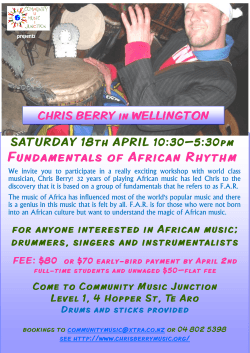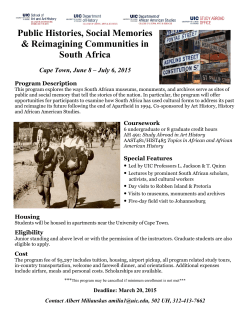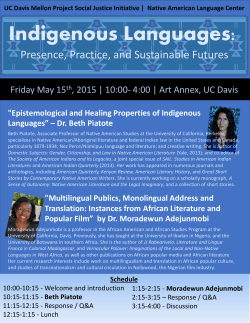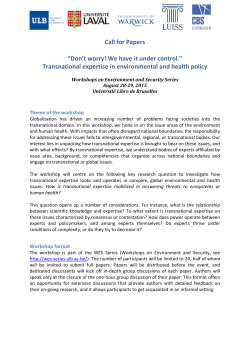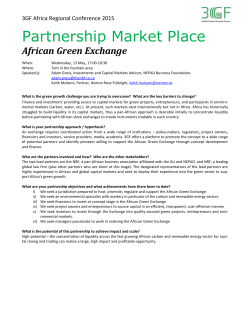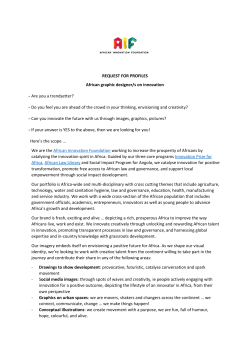
Syncretic Arenas: Essays on Postcolonial African Drama and
Syncretic Arenas: Essays on Postcolonial African Drama and Theatre for Esiaba Irobi, ed. by Isidore Diala (Rodopi, 2014) Syncretic Arenas is one of the few Festschriften combining the structure of the liber amicorum with a substantial take on a specific area of investigation. It is a compelling anthology in honor of the Nigerian-born playwright, poet and scholar Esiaba Irobi (1960-2010) and, at the same time, it actively contributes to the ongoing researches on postcolonial African drama as a transnational and transcultural phenomenon. Irobi’s work, in fact, provides an interesting case study for those who advocate the necessity of a ‘transcultural turn’ in literary and cultural studies. As aptly reminded by the editor Isidore Diala in the introduction to the volume, Irobi ‘liked to describe himself as a Biafran who led all his life “in exile in Nigeria, the UK and the USA”’ (xix), but he also managed to transform this multiple exclusion into a multifaceted creative production. Differently from his renowned predecessors Soyinka and Pepper Clark, however, Irobi has been quite neglected in the field of Postcolonial Studies until the publication of this volume, which also stands as a major contribution on the author. The first section of the book is entirely devoted to Esiaba Irobi, whose memory is celebrated in different ways, ranging from individual memories to a series of poems dedicated to him by fellow writers such as Biodun Jeyifo, Benedictus Nwachukwu, Obiwu and Olu Oguibe. Nwachukwu’s Half a Century Death, in particular, manages to effectively convey the core of Irobi’s life and works, as it might be appreciated in these two stanzas: Your performance strategy thrilled those in the house of words who profess truth; the Soyinkan model, the Shakesperean compass. Cultural appropriation to the core. Half a century plague. Creative, one, like pollination, east and west. You presented us with words of gold, frankincense and myrrh moments later you departed from the forest of words. (54) Cultural appropriation and cross-pollination are, indeed, fundamental elements of Irobi’s creative process, as he took advantage both of his ‘holistic education’ (104) – which he recalls in his long interview with Leon Osu (103-132) – and the propensity to cultural syncretism of his most renowned predecessors, Wole Soyinka and John Pepper Clark, and his fellow writer Chimamanda Ngozi Adichie, whom Irobi repeatedly praises within the same interview. Regarding Soyinka, in particular, the whole book follows the path opened by Isidore Diala’s previous works on Irobi’s drama, underlining, thus, the latter’s tight relationship with Soyinka’s oeuvre. On the one hand, in fact, Irobi’s play quoted by Nwachukwu, Gold, Frankincense and Myrrh (1989), seems to be ‘a parody of the many conferences of the 1960s and 1970s in which African writers and scholars attempted to identify and define the prime virtues of neo-African literature’ (70), including Soyinka in the list. On the other hand, as Isidore Diala points out in this volume, ‘[t]he trajectory of Irobi’s career was to tend more and more to Wole Soyinka’s, only with a more explicit interest in politics’ (72). Less marked, yet still effective, is the influence on Irobi’s writing of another Book reviews: Syncretic Arenas by Isidore Diala (ed.). Lorenzo Mari. Transnational Literature Vol. 7 no. 2, May 2015. http://fhrc.flinders.edu.au/transnational/home.html Nigerian dramatist of the precedent generation, John Pepper Clark, as noticed in his essay by Henry Obi Ajumeze (91-102). As for the political dimension of Irobi’s legacy, which differentiated his oeuvre from Soyinka’s works, it was not limited to the ‘performance strategy’, quoting Nwachukwu, that he deployed as a playwright or as a Shakespearean actor; it could be also retraced in Irobi academic writing. Suffice it to say that at the time of his premature death, Irobi had been appointed Visiting Fellow at the International Research Center at the Freie Universität of Berlin with a research project on ‘the politics and aesthetics of international performance in the age of globalization’ (16). Irobi’s criticism was also directed at the Nigerian political establishment, which never granted him any acknowledgment while he was living in Nigeria, and at the transnational academic world, which he suffered a great disappointment from, especially during his stay in the UK. In the latter regard, as Olu Oguibe recalls (9-10), Irobi bitterly criticised the UK academic environment immediately after leaving it, in a poem which was explicitly titled ‘An African Poet in England Curses His English Head of Department’, to be later collected in his cycle of poems, Rejection Slips (2004). Irobi’s political views, however, appear to be also slightly controversial, as he was ‘wary of Marxism’ (98), but his Christian faith, which he explicitly acknowledges in Osu’s interview (113), drew him nonetheless to the endorsement of a strong, albeit generic, egalitarianism. His criticism of globalizing tendencies in politics and culture, on the other hand, was never completed because of his early passing at the time of his academic stay in Berlin. In conclusion, if there is a weakness in the whole organisation of the anthology, it might be in the reproduction of this contradictory entanglement of political and cultural issues in the second section of the book, where the transnational and transcultural focus on postcolonial African theatre (covering Nigerian as well as Egyptian, Kenyan, Ugandan, South African playwrights and theatre institutions) lacks full cohesion, producing different perspectives on the political commitment of dramatists. While this might be interpreted as a direct consequence of the vagueness of the transcultural approach, as it is rooted in a growing but unstable discipline such as African Cultural Studies, it also calls for future works sharpening the critical gaze both on Esiaba Irobi’s legacy and the critical potential of a transcultural and transnational approach to postcolonial African drama and theatre. Lorenzo Mari 2 Book reviews: Syncretic Arenas by Isidore Diala (ed.). Lorenzo Mari. Transnational Literature Vol. 7 no. 2, May 2015. http://fhrc.flinders.edu.au/transnational/home.html
© Copyright 2025

